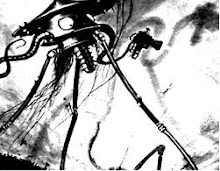Further Thoughts on Peer-to-Peer File Sharing
I wanted to follow up on my previous post about file sharing and the entertainment industry's assumptions about file sharing.
The Digital Entertainment Survey revealed that most users of peer-to-peer file sharing systems are motivated by a lack of availability of content they are seeking, and the survey revealed that a majority of these users would gladly pay for such content if it were available through legal means.
Despite this data, the authors of the survey made the unsubstantiated claim that users of peer-to-peer file sharing systems are primarily motivated by the fact that they can get the content they seek for free.
I wanted to further expand upon what is happening here. As copyright law increasingly protects vaguely defined "intellectual property" of authors and producers, it enables the copyright holders to have a "limited" monopoly (I'm going to ignore, for the moment, the fact that the "limited" monopoly granted is far lengthier in time than it should be -- that's the subject of another post) on the culture they produce. This monopoly grants copyright holders the ability to create artificial scarcity.
By definition, culture and ideas cannot be scarce. Once an idea is "out there," everyone has access to that idea. An idea is non-tangible. But the expression of that idea can be tangible (and it usually is tangible). I'm describing the idea/expression dichotomy, which was the original intent of copyright law. Increasingly, copyright law protects ideas, not just the expression of those ideas.
Since copyright grants the ability to create artificial scarcity, copyright holders have a monopoly on price as well as a monopoly on availability. Before digital mediums became more widespread, users of culture had a difficult time circumventing this artificial scarcity. Mass producing copies of content was not cheap or easy. With digital mediums, mass producing copies of content is very cheap and very easy -- all one needs is a computer with the right software. Moreover, sharing that content with millions of people is even easier with an internet connection. This is what people do with peer-to-peer networks -- they are sharing culture that is not readily available from traditional sources.
Content providers and copyright holders seem to be holding onto the old model of artificial scarcity. They don't re-issue old content often, and some content is not pressed as much as others. As the survey demonstrates, when people cannot find the content that they seek, they will go online and download the content through peer-to-peer networks. The content is readily available through these means and is not available through the traditional gatekeepers.
Instead of fighting their best customers (as the survey states, "Pirates are typically media heavy consumers and purchase considerable quantities of legal content"), content providers should take advantage of peer-t0-peer and digital technologies to provide the content that people seek for free on peer-to-peer networks. A majority of these users (two-thirds) are willing to pay for such content through legal means. You'd think that copyright holders would take advantage of this market; however, you'd also be asking them to relinquish their control of this content by releasing easily accessible digital copies of content.
This is why I think that such change is unlikely; the entertainment industries have been fighting for years to create more legal controls over the flow of information. By nature, peer-to-peer networks are anarchist. There is little in the means of authority and control because the internet is governed by protocols, or a handshake between two talking computers. Power is evenly shared within these distributed networks. The industry would have to be willing to give up its current hold on the power over access to content.
Considering that the industry is now concerned with controlling not only access but use of content, this scenario seems very unlikely.



No comments:
Post a Comment